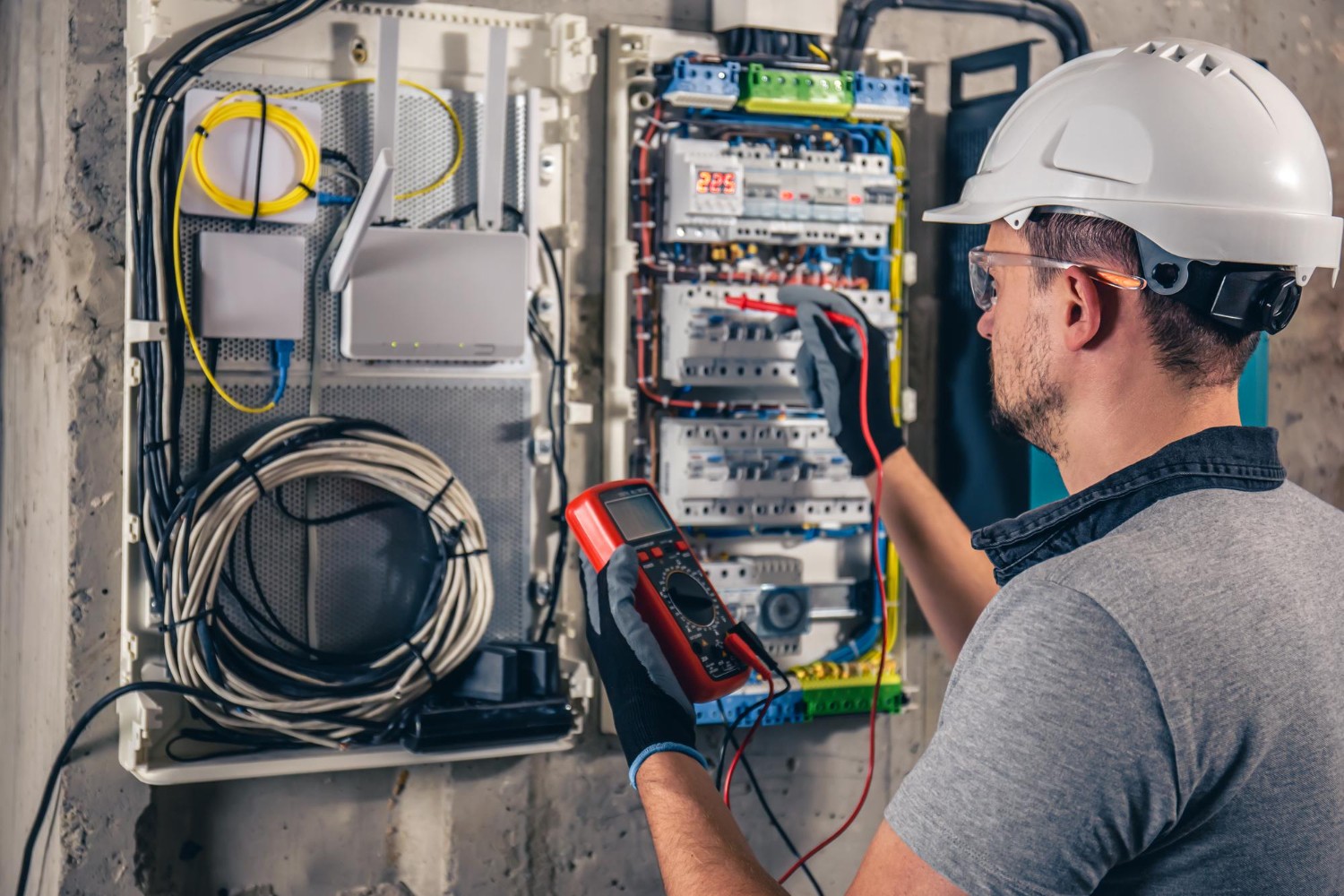Bre Automation Solutions: Changing Industrial Electrical Equipments with Cutting-Edge Technology
Bre Automation Solutions: Changing Industrial Electrical Equipments with Cutting-Edge Technology
Blog Article
Just How Commercial Electricians Give Specialized Providers to Meet the One-of-a-kind Electric Requirements of Different Industries and Facilities
Industrial electricians play a vital role in resolving the particular electric needs of diverse industries and facilities, leveraging their specialized knowledge to style, mount, and keep innovative electrical systems. Their experience not only guarantees conformity with rigorous security and regulatory criteria yet also placements organizations to maximize efficiency with innovative options such as automation and energy administration. As markets continue to progress, understanding the unique payments of industrial electricians becomes progressively crucial. What implications does this have for the future of electric operate in an ever-changing technological landscape?
Duty of Industrial Electricians
Comprehending the vital functions of industrial electricians is important for the efficient procedure of manufacturing and manufacturing centers. These specialists are responsible for mounting, maintaining, and fixing electric systems that power facility machinery and tools. Their expertise makes sure that all electrical components function smoothly, minimizing downtime and improving efficiency.
Industrial electrical experts are well-versed in reading schematics and plans, enabling them to recognize the finest positioning for electrical systems within a center. They likewise carry out routine examinations to pinpoint prospective problems prior to they rise into considerable problems. Their expertise of electrical codes and safety and security guidelines is critical, as it makes certain conformity and secures both personnel and tools.
Additionally, commercial electrical contractors play an essential role in troubleshooting and detecting electric breakdowns. By using specialized devices and techniques, they can quickly identify mistakes and apply efficient solutions. This dexterity in dealing with electric problems is crucial in preserving functional efficiency.
In enhancement to technical skills, industrial electricians often work together with engineers and other specialists to design and execute electric systems that fulfill certain functional requirements, therefore sustaining the overall goals of the center. Their payments are important to the seamless operation of commercial settings.
Key Industries Served
Industrial electricians offer a diverse range of crucial sectors, each with one-of-a-kind operational difficulties and electric needs. Among these sectors, producing sticks out as a main field, calling for robust electric systems to support equipment and automation processes. Electricians in this field make certain that production lines run efficiently, minimizing downtime via effective maintenance and troubleshooting.
The power industry additionally depends greatly on industrial electrical experts, as they play a critical function in the installation and maintenance of electric systems in power generation facilities, consisting of renewable resource resources such as wind and solar. Their competence is crucial to maintaining the effectiveness and safety of these operations.
In addition, the pharmaceutical and food processing markets require stringent adherence to security and governing standards (industrial electricians). Industrial electrical contractors in these fields are in charge of making sure that electric systems adhere to health and wellness guidelines, keeping the integrity of sensitive devices
Moreover, the building and construction industry take advantage of industrial electrical contractors throughout the installment stage of electric systems in business and commercial buildings. Their knowledge of building regulations and security guidelines is vital to effective project completion. In general, industrial electrical contractors offer vital solutions throughout these vital industries, ensuring operational efficiency and safety.

Specialized Solutions Used
With a deep understanding of the one-of-a-kind needs across various sectors, industrial electricians provide an array of specialized services tailored to fulfill particular functional demands. These solutions commonly include advanced electrical system design and installment, making sure that each facility's facilities is enhanced for efficiency and safety.
Along with basic installations, industrial electrical experts regularly supply upkeep and fixing services for intricate electrical systems. This positive method helps prevent unanticipated downtime and expands the life expectancy of tools. They are also skilled in retrofitting existing systems to boost power efficiency, which is vital for companies aiming to minimize operational expenses and environmental influence.
One more essential solution used is the implementation of automation and control systems, which are essential for boosting efficiency in producing atmospheres. Industrial electrical experts can integrate sophisticated innovations, including programmable logic controllers (PLCs) and industrial interaction networks, to streamline procedures.
Furthermore, they focus on power circulation options, guaranteeing that electric lots are well balanced and that centers are equipped to manage peak demands - licensed electrical contractor. On the whole, the competence of industrial electrical experts in these specialized services significantly adds to the smooth operation of different commercial industries
Compliance and Security Requirements

Industrial electrical contractors not only guarantee that setups satisfy lawful demands however additionally make every effort to surpass them via regular inspections and maintenance. Their proficiency allows them to identify potential risks and implement corrective steps proactively. This includes using proper individual safety equipment (PPE), sticking to lockout/tagout treatments, and making sure correct grounding of electrical systems.
In addition, staying current with evolving safety and security policies is essential for industrial electricians. Constant education and training allow them to stay compliant with upgraded codes, ensuring that centers run securely and efficiently. Additionally, they might aid business in accomplishing accreditations associated with safety and security, which can improve the general track record and reliability of the organization. Eventually, focusing on compliance and safety standards is an essential element of the specialized services given by industrial electricians, safeguarding both workers and infrastructure.
Future Trends in Industrial Electric Work
Accepting technological improvements is positioned to improve the landscape of commercial electrical operate in the coming years. The integration of clever technologies, such as Continue the Internet of Things (IoT), will make it possible for real-time surveillance and monitoring of electrical systems, enhancing operational efficiency and predictive upkeep. This shift in the direction of automation straight from the source not only minimizes downtime yet likewise enables more accurate evaluations of electric efficiency across different commercial markets.
In addition, the increase of sustainable power resources will certainly drive commercial electrical experts to adapt their skills to collaborate with solar panels, wind generators, and power storage space systems. This change is important as industries progressively focus on sustainability and minimizing their carbon impacts.
An additional substantial fad is the expanding focus on cybersecurity within industrial atmospheres. As systems end up being a lot more interconnected, shielding these facilities from cyber threats will need specialized knowledge and innovative solutions from electricians.
Verdict
To conclude, commercial electrical experts play a critical duty in resolving the distinctive electrical needs of diverse sectors. Through specialized services such as system installment, layout, and maintenance, they ensure conformity with security policies while enhancing functional effectiveness. As sectors remain to develop, the know-how of industrial electricians will certainly stay necessary in adjusting and executing ingenious solutions to arising modern technologies. Their contributions substantially affect the security and efficiency of commercial centers, promoting a lasting working setting.

Report this page